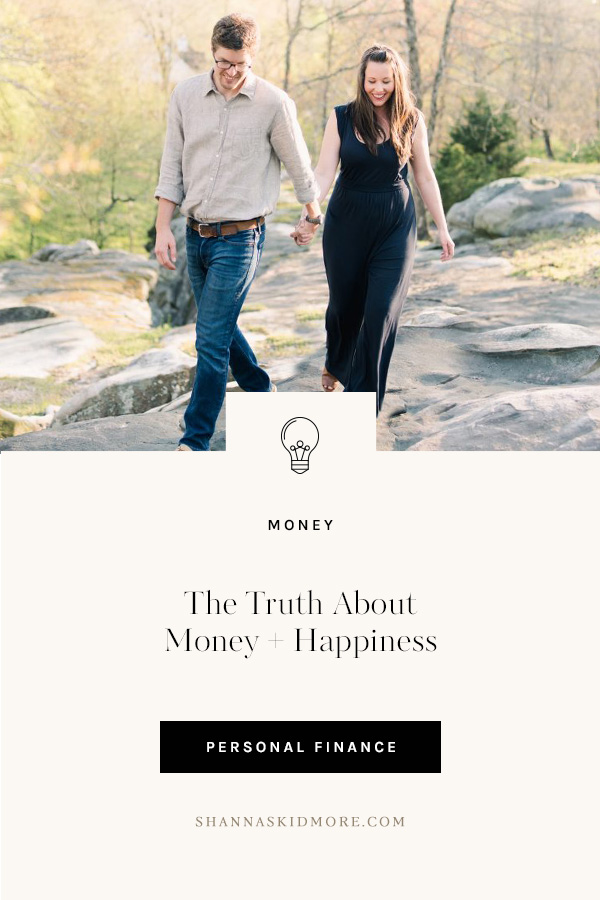Keep Reading
The Truth About Income and Happiness
Can I ask you question?…. How much money would you be content with making this year? Seriously… stop reading for a second, and get a number in your mind. For all of you follow-the-directions types out there … a) yes, I mean after taxes b) and yes, by content I mean, as dictionary.com puts it, […]

Paragraph
Can I ask you question?….
How much money would you be content with making this year?
Seriously… stop reading for a second, and get a number in your mind.
For all of you follow-the-directions types out there …
a) yes, I mean after taxes
b) and yes, by content I mean, as dictionary.com puts it, “a state of happiness and satisfaction.”
Got your number? Okay, then I have a follow-up question for you:
What would that amount of money buy?
In other words, how do you plan to spend it?
I’ve traveled across the country speaking to creative entrepreneurs about money, mindset and fulfillment and asked them these same questions. You might be surprised to hear the most common answers I get …..
- Q. How much money would you be content to make this year? A. $40,000
- Q. What does that amount of money buy? A. Blank stares
Can money buy happiness?
How often have you felt like just one more client, or (ahem) just one more ideal client, would make you truly happy? Just one more purchase or one more launch, and you’d be set. If only you could make it to six-figures, then you’d be content, right?
We can spew the old, “Money can’t buy happiness,” adage until the cows come home, but somewhere deep down our actions just don’t match our words. We want more.
In 2015, Angus Deaton won the Nobel prize in Economists. Snoooooooore. I get it, but don’t let me lose you here. The study he published suggests that income and happiness are only correlated up to $75,000. Actually, the study wasn’t about happiness at all, but more about wellbeing. Mr. Deaton found that only until household income reaches $75,000 does money seem to buy more happiness. After that point, he found no direct correlation between increased income and increased wellbeing.
What does that tell us?
- There is a baseline need. Under $75,000 there are going to be more basic needs unmet and less excess income leftover, resulting in more feelings of longing.
- After those needs are met (arguably the $75,000 household income), it’s all about how we spend the money we make.
Do you want to know the truth about income + happiness (aka “how to feel more satisfied with the income you’re making”):
Maybe Jessie J is on to something:
Why is everybody so obsessed
Money can’t buy us happiness
Can we all slow down and enjoy right now
Guarantee we’ll be feeling alright
1.
KNOW YOUR NEED
According to GALLUP only 30% of US households have a budget. Now I know that “BUDGET” is like a six-letter curse word for a lot of us. That’s why just a few years ago, I decided to flip the script on budgets and start calling them “Spending Plans.” This goes back to my second question: “What would you buy with that income?” Often I hear entrepreneurs throw out goals like “make six-figures,” or “replace my corporate salary.” Both are great goals, but they’re meaningless unless tied to actual consumption. Think of it this way: What do you want to buy? And how much does that cost?
2.
GO IN WITH A PLAN
As Dave Ramsey suggests, you need to honor every dollar. Back when I worked in the world of finance with my black power suits and three inch high heels, I used to say this sentence on the daily: “What they need more than anything is a budget.” You see, it may have been the doctors and lawyers (and let’s face it, the other finance professionals) driving the fancy cars, but it was often the teachers who felt they had more control over their money. I think that’s because teachers never went into their profession believing that having more than enough was an option. They were prepared to spend intentionally because excess wasn’t the expectation. But the white collar types I worked with expected the excess, and as a result, they often spent what they expected to make, not what was actually coming in! Wealth isn’t about how much money you make; it’s about how you spend the money you make.
3.
SPEND WITH INTENTION
I cannot tell you the amount of wine and tear inducing financial chats I’ve had with clients come April 14th every year. Clients who look back at the year behind them and say, “Where did all that money go?” It’s not fun to see how much money you actually made next to how much money you blew. Tony Robbins says, “Happiness is progress.” I love that. It’s not about the destination; it’s about each step you take towards it.
4.
PURSUE ENOUGH
Erin Loechner wrote one of my favorite books of all time, Chasing Slow. In the book she talks about how the concept of more is unquantifiable. In other words, there will always be more. More is a moving target. In business I think we often focus on getting to the destination, on hitting the goal. Very few people talk about what happens when you actually hit the goal. When I hit my first goal, I was caught off guard by what happened next. I thought I’d be sipping pina coladas, kicked back somewhere carefree. But I wasn’t carefree at all. In fact, the opposite happened. I was afraid I’d never hit that number again. I feared the sales would stop. I worried I’d get left behind. Over these past eight months of being social media free, I discovered a new mantra for life. You see, I’ve been running the rat race for a good decade now, but now I want to chase wellbeing, satisfaction and fulfillment. When it comes to money and happiness, I believe there is only one true way to find it: pursuing enough. You can learn more about my social media journey and my new mission, The Fulfilled Life Project, here.
So what’s the point? What’s the takeaway? Stop believing the lie that more = happiness. And instead, get smart. What do you truly need? And what steps are you going to take to get there?
I promise, the more intentionally you spend, the more happiness and satisfaction you’ll feel in where your dollars went.
ARE YOU READY TO MAKE REAL PROGRESS TOWARD YOUR PERSONAL FINANCIAL GOALS?
Save your seat for my FREE TRAINING : “How to afford the life you dream of living”

October 30, 2017
Previous Post:
Next Post:
And if you found this helpful, share with your friends!
Hey Shanna,
This is such an interesting take on finances, and I love that you’ve aligned yourself ‘wellbeing focuses’ rather than a ‘certain number’.
Thank you so much for sharing, this has given me food for thought!
Monica x
Thanks for reading! xo
This shift in mindset is something I have been missing as I conceptualize my plan for my business (and I didn’t even realize it until now!) Thank you for sharing!
Awesome! Thanks for reading and your comment! xx